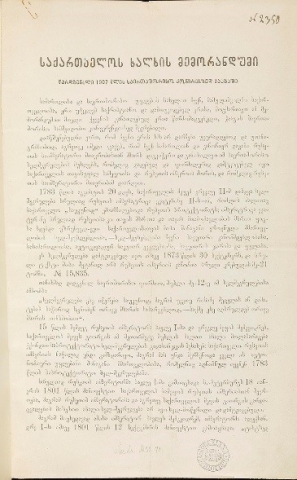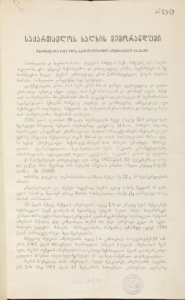1907 Georgian Independence Petition Discovered by Oxford University’s Bodleian Libraries
To mark the centenary of the independence of the Republic of Georgia on 26 May 2018, a ‘lost’ century-old ‘Petition of the Georgian People’ to the 1907 Hague International Conference has been digitized and made freely available online by the Bodleian Libraries, University of Oxford. The 29-page petition details an important moment in Georgia’s struggle for national autonomy and is the first documented instance of Georgians from all backgrounds coming together to petition the international community to uphold Georgian rights and autonomy.
The historic petition has been held in the Bodleian’s world-class Georgia collection since 1920, and was catalogued in the 1970s, but its significance was only revealed in March 2018 due to the research efforts of two Georgian academics, Dr. Beka Kobakhidze and Dr. Nikoloz Aleksidze, and Dr Gillian Evison, Head of Oriental Collections at the Bodleian Libraries. The general principles outlined in the petition have been translated into Georgian, English and French and are widely known, but the original copy of the petition containing over 3,000 signatures has never been made public or been readily accessible to scholars until now. It can be viewed on the Bodleian Libraries’ Digital.Bodleian website: 1907 petition
Signed by men and women from all regions of Georgia, at great personal risk, the petition was presented at a conference at The Hague in 1907, when ‘subjected races’ had the chance to air their grievances on an international stage. The petition outlines Georgian grievances against Imperial Russian Policies, protesting at Imperial Russia’s annexation of Georgia in 1801, in violation of the 1783 Georgian-Russian Treaty, and calls on the Great Powers to stop Russian atrocities and pogroms in Western and Central Georgia. Although the petition itself didn’t directly lead to the independence Georgia would enjoy in 1918, it marks the first time that people across Georgia, from all social classes, came together to speak up for the rights of Georgian citizens.
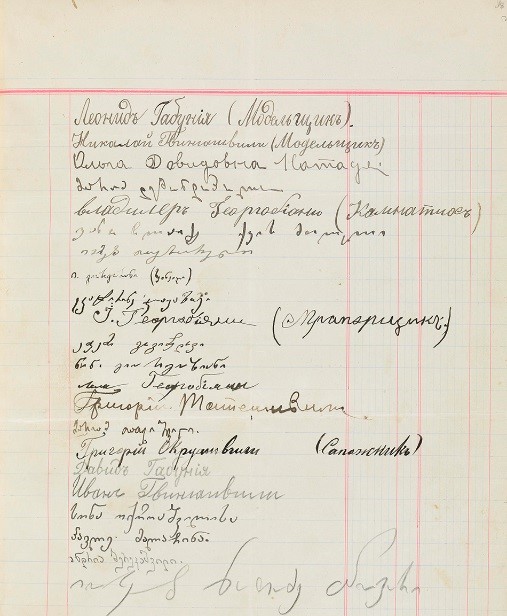
The 29-page petition contains signatures written on several different types of paper. Here over twenty names are signed on ledger paper, usually used in accounting. Source: Bodleian Libraries, University of Oxford
The Georgian petition was instigated by Georgian nationalist, Varlam Cherkezishvili, who had escaped from Siberian exile in the 1870s and settled in London, where he continued to campaign for Georgian rights. Cherkezishvili became a close friend of siblings Oliver and Marjory Wardrop. At a time when most people were unaware of Georgia, much less spoke the language, the Wardrops developed a remarkable passion for Georgian history, culture and literature and are still revered in Georgia for the impact they had in widening appreciation of this country. In 1891, Oliver Wardrop entered UK diplomatic service and in 1907 informally helped Cherkezishvili draft the petition and circulate it among political and diplomatic circles.
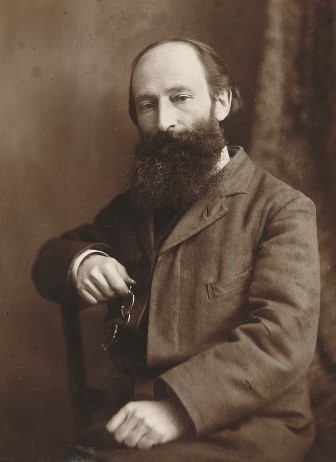
The Georgian petition was instigated by Georgian nationalist, Varlam Cherkezishvili, who had escaped from Siberian exile in the 1870s and settled in London, where he continued to campaign for Georgian rights. Cherkezishvili became a close friend of siblings Oliver and Marjory Wardrop. Source: Bodleian Libraries, University of Oxford
“At a time when there was no compulsory education and a high rate of illiteracy, the petition is the first documented instance when the Georgian national historic narrative of the Georgian-Russian relationship comes not from elite groups, but from ordinary people of all social classes,” said Dr Beka Kobakhidze Georgian Studies Fellow at the University of Oxford. “Men and women, entrepreneurs, workers, nobles, peasants, clergymen and teachers from all regions of Georgia put their signatures to this address to the political west.”
The petition was bound and presented to The Hague in a way that gives no greater precedence to the signatures of well- known names than those of teachers, clergymen and workers. The petition’s format is something that particularly struck Dr Gillian Evison, Head of Oriental Collections at the Bodleian Libraries.
“As a librarian, I’m always interested in the physical form as much as the content, and this petition is particularly striking,” she said. “Signatures have been collected on many different sheets of paper – accounting paper, on the back of the petitions, and written in ink, or pencil – so it tells its own story of how keen Georgians were to make their mark through whatever means were available to them.”
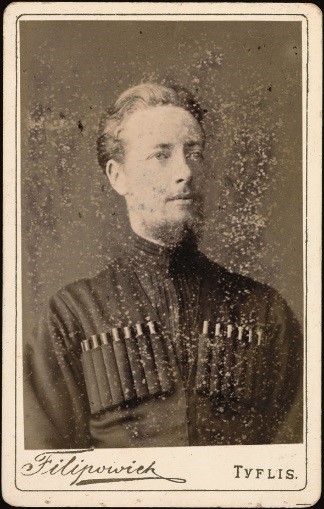
Sir Oliver Wardrop in Georgian costume, 1887. At a time when most people were unaware of Georgia, much less spoke the language, the Wardrops developed a remarkable passion for Georgian history, culture and literature and are still revered in Georgia for the impact they had in widening appreciation for this country. In 1891, Oliver Wardrop entered UK diplomatic service and in 1907 informally helped Cherkezishvili draft the petition and circulate it among political and diplomatic circles. Source: Bodleian Libraries, University of Oxford
Sir Oliver Wardrop later went on to become the United Kingdom’s first Chief Commissioner of Transcaucasia in Georgia, 1919-1920, and maintained a lifelong interest in the country. The petition came to the Bodleian Libraries with the donation of the Wardrop Collection, one of the largest collections of Georgian materials in the world. The collection was donated to the Bodleian between 1910 and 1948 by Sir Oliver Wardrop, in memory of his sister Marjory Wardrop who died aged 40 in 1909. The Wardrop collection contains a wealth of many unseen letters and materials relating to Georgia’s 20th century struggle for independence, which so far have only been studied by a handful of scholars.
Dr Gillian Evison, Head of Oriental Collections at the Bodleian Libraries said: “Marjory and Oliver Wardrop had a remarkable relationship with the country and people of Georgia. I’m delighted that the importance of this petition has been recognized and is now available to Georgians online in this special year of Georgian independence.”
Dr Beka Kobakhidze, Georgian Studies Fellow at the University of Oxford added “I am honored for that part I’ve played in making these signatures and many forgotten names public after 111 years. Looking through the petition, I had a feeling that I was interacting with my ancestors, people who stood for national liberties while risking their lives. Over a century after these people made their mark on this petition, I realize that Georgia has inherited not only the legacy of their deeds, but challenges too. Today’s Georgians are eagerly awaiting the publishing of names of some 3000 signatories where they expect to find their great grandparents, relatives and the like, and I hope they will enjoy reading it in full online.”
Richard Ovenden, Bodley’s Librarian said: “The Wardrop Collection is one of the Bodleian’s globally-significant collections and its long-overlooked presence of the Petition in our library shows the important role that libraries play in the preservation and dissemination of information on behalf of society. I hope the interest in this item will encourage greater scholarship on Georgia, the Wardrops, and this turbulent period of history.”
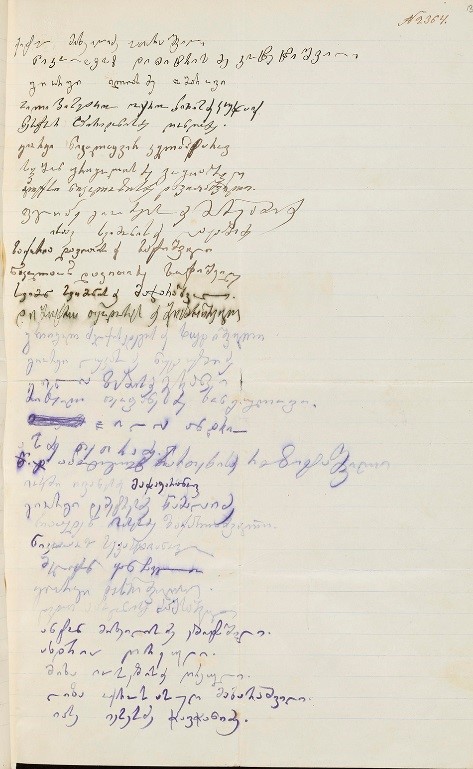
This page of the petition shows a selection of the signatures of the 3,000 Georgians who signed the petition. You can tell buy the varied colours of ink that this petition was signed at different times and, possibly, in different places. The signatures written in the light blue ink are smudged, presumably from the rain. Source: Bodleian Libraries, University of Oxford
"The re-emergence of this petition and the rich detail now available online is very exciting,” said Justin McKenzie Smith, British Ambassador to Georgia. “In many ways, the history of links between Britain and Georgia is still being written. The Wardrop Collection at the Bodleian Library is a treasure trove of information. Out of the friendships made by Oliver and Marjory Wardrop and their solidarity with the Georgian people has come the strong, fast-growing relationship that exists between our two countries today."
***
About the Georgian collection at the Bodleian Libraries
The nucleus of the Bodleian Library’s rich holdings of Georgian books and manuscripts is the Wardrop Collection, formed by Sir Oliver Wardrop and his sister Marjory. After Marjory’s early death in 1909, the Marjory Wardrop Fund was founded for the encouragement of Georgian studies and from 1910, through this fund, the Bodleian became the beneficiary of all Marjory Wardrop's papers, books and manuscripts. They were supplemented by further donations from Sir Oliver until his death in 1948. As a result, the Bodleian has become the major European repository of Georgian material outside of Russia and continues to add to this remarkable collection.
About the Bodleian Libraries
The Bodleian Libraries at the University of Oxford is the largest university library system in the United Kingdom. It includes the principal University library – the Bodleian Library – which has been a legal deposit library for 400 years; as well as 27 libraries across Oxford including major research libraries and faculty, department and institute libraries. Together, the Libraries hold more than 13 million printed items, over 80,000 e-journals and outstanding special collections including rare books and manuscripts, classical papyri, maps, music, art and printed ephemera. Members of the public can explore the collections via the Bodleian’s online image portal at digital.bodleian.ox.ac.uk or by visiting the exhibition galleries in the Bodleian’s Weston Library. For more information, visit www.bodleian.ox.ac.uk.
Main photo: The front page of the 1907 petition of ‘the people of Georgia’ presented at the International Conference on ‘subjected races’ at The Hague. The petition outlines Georgian grievances against Imperial Russian Policies, protesting at Imperial Russia’s annexation of Georgia in 1801, in violation of the 1783 Georgian-Russian Treaty, and calls on the Great Powers to stop Russian atrocities and pogroms in Western and Central Georgia. Source: Bodleian Libraries, University of Oxford
